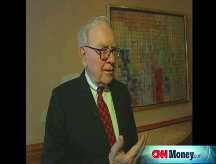What would Warren do?
Or better yet - what is the Oracle up to in this market, and can you do the same?
(Money Magazine) -- Warren Buffett has already told the world what he's doing in this frightful market. The Oracle of Omaha proudly proclaimed that he's "been buying American stocks" with his personal funds.
But it should also be noted that Buffett has been putting his investors' money on the line as well. After sitting on piles of cash for several years and lamenting the lack of attractive opportunities, Buffett has made several key acquisitions through his investment conglomerate, Berkshire Hathaway, culminating in a flurry of late- September and early-October deals.
In just a two-week span, Buffett picked up Constellation Energy for the relative bargain price of $4.7 billion. He bought $5 billion in preferred stock from Goldman Sachs, receiving a fat 10% yield. And he purchased $3 billion in preferred shares of GE, also yielding 10%.
This doesn't mean Buffett is saying go out and buy Goldman or GE (GE, Fortune 500) stock. In fact, there are plenty of reasons why you shouldn't try to follow his lead, not the least of which is the fact that Berkshire gets deals that individuals simply can't.
But that's not the point. The opportunity here is to pick up some valuable investing wisdom from the greatest practitioner alive. In this spirit, here's what I think you can learn from Buffett's moves:
It's the most famous of all Buffett-isms: "Be fearful when others are greedy and greedy when others are fearful." Today there's ample evidence that people are scared, as fund investors have been redeeming record amounts of money from their stock portfolios.
By contrast, Buffett is putting his money to work. Berkshire's cash balance, by my estimate, is at its lowest level in recent memory.
Now, this doesn't mean the market will turn around tomorrow. But Buffett's point is that this is not the time to flee U.S. stocks. In fact, now is a great time to be looking for shares of high-quality firms that have been beaten down to affordable levels.
For examples of attractively priced industry leaders, see the suggestions to the right.
Buffett's investment in Goldman Sachs (GS, Fortune 500) was surprising to many, given his frequent digs at Wall Street's casino culture and a problematic investment he made in Salomon Brothers.
In 1987, Buffett bought a stake in Salomon to ward off a hostile takeover, but the firm nearly collapsed amid a bond bid-rigging scandal a few years later, and Buffett had to step in as interim chairman.
Although the investment eventually worked out - Salomon was bought by Travelers, which merged with Citicorp to form Citigroup (C, Fortune 500) - it's safe to say that it was a longer and harder road than he had anticipated.
Still, Buffett understood that investment banking, for all its recent woes, is an attractive business if managed properly. The group of top-tier firms is fairly small, and it would be hard for a new competitor to break into the business, which gives Goldman Sachs tremendous bargaining power over its customers.
There's an important lesson in this for individual investors. Just because many financial stocks in your portfolio have imploded recently, it doesn't mean you should sell out of this sector entirely - or turn your back on these stocks for good.
Buffett is famous for having said that his favorite holding period is "forever." But he will sell a stock he loves if conditions warrant. For example, late last year, as crude-oil prices were approaching $100 a barrel, Buffett jettisoned his stake in PetroChina (PTR).
Why? After multiplying more than fivefold since he bought it a few years earlier, PetroChina shares had reached fair value, so he sold. Since he cashed out, PetroChina shares have been cut in half.
Chalk this up to a lesson the Oracle learned in the late '90s. As he admitted in 2003, "...I made a big mistake in not selling several of our larger holdings during the Great Bubble."
Buffett similarly made what may be one of his best decisions when he sold Berkshire Hathaway's long-held stake in Freddie Mac (FRE, Fortune 500) in 2000. He's never written about exactly why, but he noted presciently at his 2001 annual shareholder meeting that Freddie Mac's "risk profile had changed."
While the rest of the world gorged on cheap credit, Buffett maintained Berkshire's conservative profile. This hindered his returns when times were good, but having lots of cash on hand enabled Buffett to snap up once-in-a-lifetime deals, like Constellation Energy (CEG, Fortune 500).
Buffett, who owns several utilities, jumped on Constellation in September after its shares tumbled from around $60 to his purchase price of $26.50 in a mere matter of days. The result: He nabbed a company that produces nearly $1 billion in earnings a year for less than $5 billion.
Now, you may not be in a position to keep $40 billion in the bank. But as Buffett showed, it's smart to have some cash on hand for opportunistic purchases. What's more, there's nothing wrong with being disciplined enough to turn your back on stocks that you're not 100% confident in. That's sage advice.
Send feedback to Money Magazine



